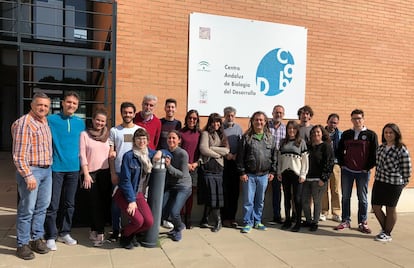A woman shows capsules of coenzyme Q10.Professor25 / Getty Images / iStockphoto
Everything that the human body does, from thinking to distributing blood, requires energy, and any interruption in its generation, a function that falls mainly on the mitochondria (the organelle where cellular respiration takes place), is related to a wide range of diseases. In these energy factories, which transform sugar and fat, coenzyme Q10, a molecule popularized by the cosmetic industry, plays a fundamental role, far beyond the alleged aesthetic benefits. A joint study of the Andalusian Center for Development Biology (Pablo de Olavide University -UPO- and CSIC),of the Laboratory of Cellular and Bioenergetic Physiopathology (UPO) and the Ciberer of the Carlos III Health Institute warns that the deficiency of this substance is underdiagnosed and proposes new formulas to analyze its presence in the blood and the treatment needs.
More information
The vitamin D pandemic
Coenzyme Q10 (CoQ10), naturally present in cells, helps mitochondria to produce the energy needed for all body functions.
"It is essential in the transport of electrons," explains Guillermo López Lluch, professor of Cell Biology at the UPO and co-author of the study, published in
Biofactors
, of the International Union of Biochemistry and Molecular Biology.
Coenzyme deficiency generates energy insufficiency that can cause or contribute to mitochondrial disorders, heart disease, stroke, and neurodegenerative pathologies, such as Alzheimer's and Parkinson's.
The brain, heart and muscles are the organs that need the most energy and are especially vulnerable to a deficit of it.
The brain, heart and muscles are the organs that need the most energy and are especially vulnerable to a deficit of it
López Lluch identifies two types of Q10 deficiencies: “The primary, which occurs in people who cannot synthesize it, mainly due to genetic causes, and the secondary, which can be the cause or consequence of chronic diseases, such as diabetes, neurodegenerative or due to the aging".
Under normal conditions, cells synthesize the coenzyme from food, especially fatty foods, such as meat, fish or oils.
However, this process, which involves, according to the cell biologist, up to 12 proteins, can be deficient in some people.
In addition, the researcher adds, the blood and organs such as the liver or kidney absorb it well, but not the muscles and the brain.
Underdiagnosis leads to a mistakenly low prevalence of CoQ10 insufficiency in cells
The research, led by Plácido Navas Lloret, also a UPO professor of Cell Biology, warns that Q10 deficiencies, especially secondary ones, are “underestimated, since many of its clinical manifestations are shared with other pathologies” or because, in the case of the primaries, the dominant genetic mutations responsible for the disease are not reported. This underdiagnosis leads to a mistakenly low prevalence of CoQ10 insufficiency in cells, "which can lead to mitochondrial disease because this molecule participates in vital cellular functions," according to the study. López Lluch adds that the presence of the enzyme in the blood helps with cholesterol, prevents damage to the arteries and has benefits for the immune system, among other virtues.
The research warns that "secondary CoQ10 deficiency could be present in a significant number of patients without typical clinical manifestations" or that "there may even be patients with levels within the range, but close to the lower threshold."
In these cases, the researchers assure that the diagnosis would be possible with biochemical and genetic methods that, in addition, would allow to know the state of Q10 in the blood (oxidation or reduction) and differentiate when a defect in the synthesis is the origin of the disease or the consequence.
"This type of analysis would help to improve the diagnosis and understand the physiological processes affected", conclude the authors, who declare the absence of conflict of interest at work.
The Q10 enzyme research team, in an image taken before the pandemic.
Q10 supplements
The importance of the diagnosis is fundamental because the deficiency, in most cases, can be corrected through diet or with specific supplements.
Marni Falk, director of the Frontier program in mitochondrial medicine at Children's Hospital of Philadelphia and author of a paper published in
Molecular Genetics and Metabolism
,
explains that mitochondrial disease is the result of malfunctions in the energy-generating “batteries” that power our cells. “Many patients,” he adds, “take vitamins and supplements on an empirical basis, relying on the assumption that this somehow benefits their altered cellular metabolism. Unfortunately, most of these compounds are not currently regulated, standardized, tested, or compared to others to determine which may be the safest, most potent, and effective in any given type of mitochondrial disease. " In their research, two coenzyme Q10 compounds, one of them specifically targeting mitochondria, improved some health indicators in the worms that were the object of the experiment.
A clinical trial from the University of Colorado Boulder, published in
Hypertension
,
of the American Heart Association, has tested a supplement of 20 milligrams daily with Q10 for six weeks with 20 healthy people aged 60 to 79 years. The result showed benefits in the endothelium (the lining of the blood vessels) and in increasing blood flow. According to lead author Matthew Rossman, from the department of integrative physiology, “This is the first clinical trial to evaluate the impact of a specific mitochondrial antioxidant on vascular function in humans and suggests that therapies like this may be a true promise to reduce the risk of cardiovascular diseases related to age ”,
You can follow MATERIA on
,
and
, or sign up here to receive
our weekly newsletter
.

